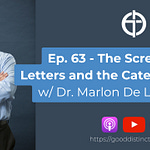NOTE: THIS EPISODE WAS PUBLISHED BEFORE OUR REBOOT. willwrightcatholic.com is now gooddistinctions.com
“Stop Being So Judgemental!”
One of the most quoted verses in the Bible today is some iteration of the following:
“Judge not, that you be not judged. For with the judgment you pronounce you will be judged, and with the measure you use it will be measured to you. Why do you see the speck that is in your brother's eye, but do not notice the log that is in your own eye (Matthew 7:1-3)?”
Usually when we hear it, though, we hear: “don’t be so judgy!”, “only God can judge me”, “you’re so judgemental!”, or “stop being so judgemental!” But is that what this passage means? Are we never allowed to pass judgment? Can we judge others? What’s the truth of the matter?
In looking at this topic, we are going to investigate four main questions: What is a judgment? Can we judge people? What can we judge? What are the spiritual dangers when we judge?
What is a Judgment?
First, what is a judgment? This might sound like an obvious question with an obvious answer, but let’s take another look.
The verb to judge is shared in English and French and comes from the Latin iudicere which means, generally, to proclaim, determine, or conclude. However, in a legal sense, from Roman usage, we get a few synonyms: accuse, reprimand, condemn, and damn. The word came from two root words: ius and dico. Ius means law or right and dico means I call or I point out.
I love word etymology. Usually when I am trying to figure out what a word really means, I look at the history of it. Here is no different, and, in fact, we have already stumbled on an important fact. Even in the Latin context, there are two usages of the verb to judge - one means to proclaim or determine and the other means to reprimand and condemn. These are very different usages of the same word!
So, we could say that there are two types of judgments, generally speaking. The first judgment belongs to any individual who has come to a conclusion and makes a proclamation. The second judgment pertains to one with authority handing over a ruling. Put another way: the first is an action (to judge) and the second is a job (acting as judge).
Can We Judge People?
Jesus Christ, the Son of God, is the one and only eternal Judge. As we read in the Gospel of St. John:
“For the Father judges no one, but has given all judgment to the Son, that all may honor the Son, just as they honor the Father. Whoever does not honor the Son does not honor the Father who sent him. Truly, truly, I say to you, whoever hears my word and believes him who sent me has eternal life. He does not come into judgment, but has passed from death to life (Jn. 5:22-24).”
Only He can discern the thoughts and feelings of the heart, mind, and soul. Judgment, in the eternal law sense, belongs only to God. To only Jesus is the judgment of damnation reserved. Upon death, all will appear before Him and He will make the eternal, lasting judgment of the state of one’s soul, ultimately, to Heaven or Hell.
So, can we judge other people? The answer is simple: absolutely not. This is what Jesus means when He says, “Judge not, that you will not be judged.” We are not omniscient, omnibenevolent, and omnipotent. We simply are not equipped to be the Judge. We do not know the state of someone’s soul.
What Can We Judge?
If we cannot judge others. Rather, I should say - going back to our Roman dual-usage of the word - that we are not the Judge. What then can we judge? Jesus also says in the Gospel of St. John: “Do not judge by appearances, but judge with right judgment (Jn. 7:24).” It seems, then, that we can judge something! At the very least, Jesus is asking us to use *right* judgment.
Counsel is one of the gifts of the Holy Spirit. It is also called “right judgment.” Counsel is the perfection of the cardinal virtue of prudence. Counsel allows us to judge promptly and rightly what should be done in especially difficult situations. Of course, this is a gift from God for our own personal use. What then is the right judgment of others? I think a prerequisite would have to begin with a firm grasp of the virtue of prudence.
Prudence is the virtue that disposes of practical reason to discern our true good in every circumstance and to choose the right means of achieving it, using the language of the Catechism. Put more succinctly, quoting Aristotle: “recta ratio agibilium” - “right reason applied to practice.” By practicing and growing in the virtue of prudence, we begin to determine with greater ease what is truly right or truly wrong. This is why the Catechism refers to prudence as the “charioteer of the virtues.”
To paraphrase St. Thomas Aquinas, prudence allows us to do three things: 1) to discern the best means for action, 2) to judge soundly whether that means is fitting, and 3) to command the employment of the means. As we grow in this virtue, we will inevitably begin to notice when others employ less-than-virtuous means to attain a goal.
We will make judgments. Even our legal code reflects this. We make and enforce laws because we are making a judgment, collectively, that certain actions are morally good or evil, right or wrong.
Jesus presupposes this when He gives this charge to His disciples:
“If your brother sins against you, go and tell him his fault, between you and him alone. If he listens to you, you have gained your brother. But if he does not listen, take one or two others along with you, that every charge may be established by the evidence of two or three witnesses. If he refuses to listen to them, tell it to the church. And if he refuses to listen even to the church, let him be to you as a Gentile and a tax collector (Mt. 18:15-17).”
Here the disciple is making a judgment that his brother has committed a sin. Then, he is charged with telling him this judgment. I am not sure how much clearer our Lord can be in the call to judge the actions of others, at least when someone has sinned against us personally.
What are the Spiritual Dangers in Judging?
We can judge the actions of others without judging them personally. But what are the spiritual dangers of judgment?
First, we have to remember that we live in a fallen world and have an inclination to sin. We are not perfect, and, as our Lord says, we need to recognize the log in our eye before trying to remove the speck in our brother’s eye. In other words, any judgment and correction needs to come from a place of righteousness and humility. We have to be cognisant of our biases, our passions, and our own short-comings. Once we have a real sense of self-knowledge, gained in prayer, we can, then and only then, look outward.
Second, we must avoid rash judgment, detraction, and calumny. The Catechism summarizes this succinctly:
“Respect for the reputation of persons forbids every attitude and word likely to cause them unjust injury. He becomes guilty:
– of rash judgment who, even tacitly, assumes as true, without sufficient foundation, the moral fault of a neighbor;
– of detraction who, without objectively valid reason, discloses another’s faults and failings to persons who did not know them;
– of calumny who, by remarks contrary to the truth, harms the reputation of others and gives occasion for false judgments concerning them (CCC 2477).”
The Catechism then gives a lot more on this subject from paragraphs 2478 - 2487 .
Conclusion
Judging the state of someone’s eternal soul is out of the question because you and I are not the Judge. There is only one Judge and His name is Jesus Christ, the Son of God.
Judging the actions of another, after sufficient discernment and prudence, is called for by the Lord and presumed by every human society with a legal code.
I will try to conclude by summarizing this as succinctly as I can:
Judge actions, not people.












